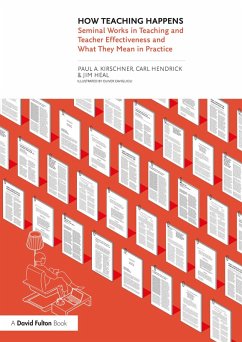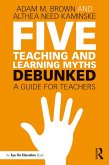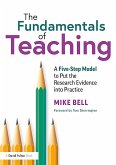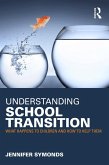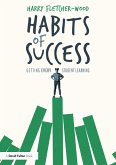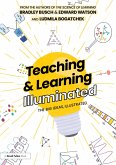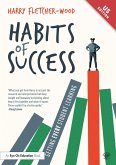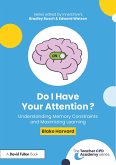Paul Kirschner, Carl Hendrick, Jim Heal
How Teaching Happens (eBook, PDF)
Seminal Works in Teaching and Teacher Effectiveness and What They Mean in Practice
21,95 €
21,95 €
inkl. MwSt.
Sofort per Download lieferbar

11 °P sammeln
21,95 €
Als Download kaufen

21,95 €
inkl. MwSt.
Sofort per Download lieferbar

11 °P sammeln
Jetzt verschenken
Alle Infos zum eBook verschenken
21,95 €
inkl. MwSt.
Sofort per Download lieferbar
Alle Infos zum eBook verschenken

11 °P sammeln
Paul Kirschner, Carl Hendrick, Jim Heal
How Teaching Happens (eBook, PDF)
Seminal Works in Teaching and Teacher Effectiveness and What They Mean in Practice
- Format: PDF
- Merkliste
- Auf die Merkliste
- Bewerten Bewerten
- Teilen
- Produkt teilen
- Produkterinnerung
- Produkterinnerung

Bitte loggen Sie sich zunächst in Ihr Kundenkonto ein oder registrieren Sie sich bei
bücher.de, um das eBook-Abo tolino select nutzen zu können.
Hier können Sie sich einloggen
Hier können Sie sich einloggen
Sie sind bereits eingeloggt. Klicken Sie auf 2. tolino select Abo, um fortzufahren.

Bitte loggen Sie sich zunächst in Ihr Kundenkonto ein oder registrieren Sie sich bei bücher.de, um das eBook-Abo tolino select nutzen zu können.
Building on their bestselling book How Learning Happens , Paul Kirschner and Carl Hendrick are joined by Jim Heal to explore how teaching happens. The book seeks to closely examine what makes for effective teaching in the classroom and how research on expert teaching can be used in practice.
- Geräte: PC
- ohne Kopierschutz
- eBook Hilfe
- Größe: 13.12MB
Andere Kunden interessierten sich auch für
![Five Teaching and Learning Myths-Debunked (eBook, PDF) Five Teaching and Learning Myths-Debunked (eBook, PDF)]() Adam M. BrownFive Teaching and Learning Myths-Debunked (eBook, PDF)26,95 €
Adam M. BrownFive Teaching and Learning Myths-Debunked (eBook, PDF)26,95 €![The Fundamentals of Teaching (eBook, PDF) The Fundamentals of Teaching (eBook, PDF)]() Mike BellThe Fundamentals of Teaching (eBook, PDF)20,95 €
Mike BellThe Fundamentals of Teaching (eBook, PDF)20,95 €![Understanding School Transition (eBook, PDF) Understanding School Transition (eBook, PDF)]() Jennifer SymondsUnderstanding School Transition (eBook, PDF)42,95 €
Jennifer SymondsUnderstanding School Transition (eBook, PDF)42,95 €![Habits of Success: Getting Every Student Learning (eBook, PDF) Habits of Success: Getting Every Student Learning (eBook, PDF)]() Harry Fletcher-WoodHabits of Success: Getting Every Student Learning (eBook, PDF)18,95 €
Harry Fletcher-WoodHabits of Success: Getting Every Student Learning (eBook, PDF)18,95 €![Teaching & Learning Illuminated (eBook, PDF) Teaching & Learning Illuminated (eBook, PDF)]() Bradley BuschTeaching & Learning Illuminated (eBook, PDF)27,95 €
Bradley BuschTeaching & Learning Illuminated (eBook, PDF)27,95 €![Habits of Success: Getting Every Student Learning (eBook, PDF) Habits of Success: Getting Every Student Learning (eBook, PDF)]() Harry Fletcher-WoodHabits of Success: Getting Every Student Learning (eBook, PDF)20,95 €
Harry Fletcher-WoodHabits of Success: Getting Every Student Learning (eBook, PDF)20,95 €![Do I Have Your Attention? Understanding Memory Constraints and Maximizing Learning (eBook, PDF) Do I Have Your Attention? Understanding Memory Constraints and Maximizing Learning (eBook, PDF)]() Blake HarvardDo I Have Your Attention? Understanding Memory Constraints and Maximizing Learning (eBook, PDF)20,95 €
Blake HarvardDo I Have Your Attention? Understanding Memory Constraints and Maximizing Learning (eBook, PDF)20,95 €-
-
-
Building on their bestselling book How Learning Happens, Paul Kirschner and Carl Hendrick are joined by Jim Heal to explore how teaching happens. The book seeks to closely examine what makes for effective teaching in the classroom and how research on expert teaching can be used in practice.
Dieser Download kann aus rechtlichen Gründen nur mit Rechnungsadresse in A, B, BG, CY, CZ, D, DK, EW, E, FIN, F, GR, HR, H, IRL, I, LT, L, LR, M, NL, PL, P, R, S, SLO, SK ausgeliefert werden.
Produktdetails
- Produktdetails
- Verlag: Taylor & Francis eBooks
- Seitenzahl: 374
- Erscheinungstermin: 23. Juni 2022
- Englisch
- ISBN-13: 9781000613711
- Artikelnr.: 63970868
- Verlag: Taylor & Francis eBooks
- Seitenzahl: 374
- Erscheinungstermin: 23. Juni 2022
- Englisch
- ISBN-13: 9781000613711
- Artikelnr.: 63970868
- Herstellerkennzeichnung Die Herstellerinformationen sind derzeit nicht verfügbar.
Paul A. Kirschner is Emeritus Professor Educational Psychology at the Open University of the Netherlands, Guest Professor at the Thomas More University of Applied Science in Belgium and owner of kirschner-ED.
Carl Hendrick holds a PhD in education from King's College London and has taught for several years in both the state and independent sectors. He currently teaches at Wellington College, UK.
Jim Heal works at Deans for Impact, a US-based non-profit organization committed to the transformation of educator preparation. He holds a Doctorate in Educational Leadership from Harvard University's Graduate School of Education.
Carl Hendrick holds a PhD in education from King's College London and has taught for several years in both the state and independent sectors. He currently teaches at Wellington College, UK.
Jim Heal works at Deans for Impact, a US-based non-profit organization committed to the transformation of educator preparation. He holds a Doctorate in Educational Leadership from Harvard University's Graduate School of Education.
Preface Section 1: Teacher effectiveness, development, and growth 1. An
Experienced Teacher ¿ An Expert Teacher 2. Those Who Understand, Teach 3.
Teachers Are Made, Not Born 4. Teachers Are Made, Not Born 5. I Think,
Therefore I Teach 6. When Thinking and Acting Become One Section 2:
Curriculum development / Instructional design 7. It's all about alignment
8. Pebble in the Pond 9. How to tell the Story of an Idea 10. If you don't
know where you're going, you might wind up someplace else Section 3:
Teaching Techniques 11. There's No Such Thing as a Child Who Can't Be
Taught 12. Burning the Strawman 13. Make Something of what You've Learnt
14. Learning: No Pain, No Gain 15. Step for Step Section 4: Pedagogical
content knowledge 16. Why You Can't Teach What You Don't Know 17.
Mathematical Knowledge for Teaching 18. The Science of Science Teaching 19.
Three Chords and the Truth 20. How Should we Teach Reading? 21. Why
Technology Should be the Servant not the Master? Section 5: In the
classroom 22. "To Thine Own Self Be True": The Authentic Teacher 23.
Relationally Speaking 24. Why Relationships Matter 25. Teachers as
Intelligent Consumers Section 6: Assessment 26. The Many Faces and Uses of
Assessment 27. When Testing Kills Learning 28. Don't Ask Questions That
Don't Require Understanding to Answer 29. Why Teaching to the Test is So
Bad 30. Hocus-Pocus Teacher Education End notes Glossary Index
Experienced Teacher ¿ An Expert Teacher 2. Those Who Understand, Teach 3.
Teachers Are Made, Not Born 4. Teachers Are Made, Not Born 5. I Think,
Therefore I Teach 6. When Thinking and Acting Become One Section 2:
Curriculum development / Instructional design 7. It's all about alignment
8. Pebble in the Pond 9. How to tell the Story of an Idea 10. If you don't
know where you're going, you might wind up someplace else Section 3:
Teaching Techniques 11. There's No Such Thing as a Child Who Can't Be
Taught 12. Burning the Strawman 13. Make Something of what You've Learnt
14. Learning: No Pain, No Gain 15. Step for Step Section 4: Pedagogical
content knowledge 16. Why You Can't Teach What You Don't Know 17.
Mathematical Knowledge for Teaching 18. The Science of Science Teaching 19.
Three Chords and the Truth 20. How Should we Teach Reading? 21. Why
Technology Should be the Servant not the Master? Section 5: In the
classroom 22. "To Thine Own Self Be True": The Authentic Teacher 23.
Relationally Speaking 24. Why Relationships Matter 25. Teachers as
Intelligent Consumers Section 6: Assessment 26. The Many Faces and Uses of
Assessment 27. When Testing Kills Learning 28. Don't Ask Questions That
Don't Require Understanding to Answer 29. Why Teaching to the Test is So
Bad 30. Hocus-Pocus Teacher Education End notes Glossary Index
Preface Section 1: Teacher effectiveness, development, and growth 1. An
Experienced Teacher ¿ An Expert Teacher 2. Those Who Understand, Teach 3.
Teachers Are Made, Not Born 4. Teachers Are Made, Not Born 5. I Think,
Therefore I Teach 6. When Thinking and Acting Become One Section 2:
Curriculum development / Instructional design 7. It's all about alignment
8. Pebble in the Pond 9. How to tell the Story of an Idea 10. If you don't
know where you're going, you might wind up someplace else Section 3:
Teaching Techniques 11. There's No Such Thing as a Child Who Can't Be
Taught 12. Burning the Strawman 13. Make Something of what You've Learnt
14. Learning: No Pain, No Gain 15. Step for Step Section 4: Pedagogical
content knowledge 16. Why You Can't Teach What You Don't Know 17.
Mathematical Knowledge for Teaching 18. The Science of Science Teaching 19.
Three Chords and the Truth 20. How Should we Teach Reading? 21. Why
Technology Should be the Servant not the Master? Section 5: In the
classroom 22. "To Thine Own Self Be True": The Authentic Teacher 23.
Relationally Speaking 24. Why Relationships Matter 25. Teachers as
Intelligent Consumers Section 6: Assessment 26. The Many Faces and Uses of
Assessment 27. When Testing Kills Learning 28. Don't Ask Questions That
Don't Require Understanding to Answer 29. Why Teaching to the Test is So
Bad 30. Hocus-Pocus Teacher Education End notes Glossary Index
Experienced Teacher ¿ An Expert Teacher 2. Those Who Understand, Teach 3.
Teachers Are Made, Not Born 4. Teachers Are Made, Not Born 5. I Think,
Therefore I Teach 6. When Thinking and Acting Become One Section 2:
Curriculum development / Instructional design 7. It's all about alignment
8. Pebble in the Pond 9. How to tell the Story of an Idea 10. If you don't
know where you're going, you might wind up someplace else Section 3:
Teaching Techniques 11. There's No Such Thing as a Child Who Can't Be
Taught 12. Burning the Strawman 13. Make Something of what You've Learnt
14. Learning: No Pain, No Gain 15. Step for Step Section 4: Pedagogical
content knowledge 16. Why You Can't Teach What You Don't Know 17.
Mathematical Knowledge for Teaching 18. The Science of Science Teaching 19.
Three Chords and the Truth 20. How Should we Teach Reading? 21. Why
Technology Should be the Servant not the Master? Section 5: In the
classroom 22. "To Thine Own Self Be True": The Authentic Teacher 23.
Relationally Speaking 24. Why Relationships Matter 25. Teachers as
Intelligent Consumers Section 6: Assessment 26. The Many Faces and Uses of
Assessment 27. When Testing Kills Learning 28. Don't Ask Questions That
Don't Require Understanding to Answer 29. Why Teaching to the Test is So
Bad 30. Hocus-Pocus Teacher Education End notes Glossary Index
